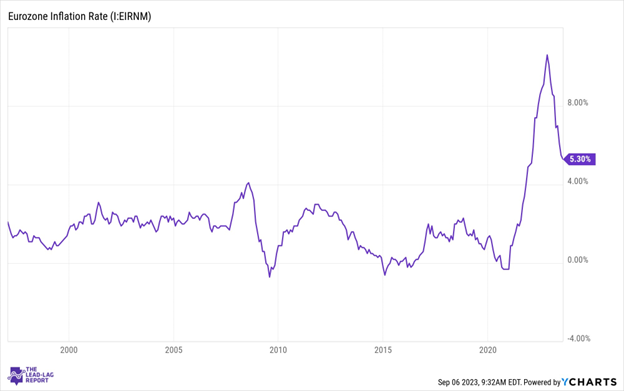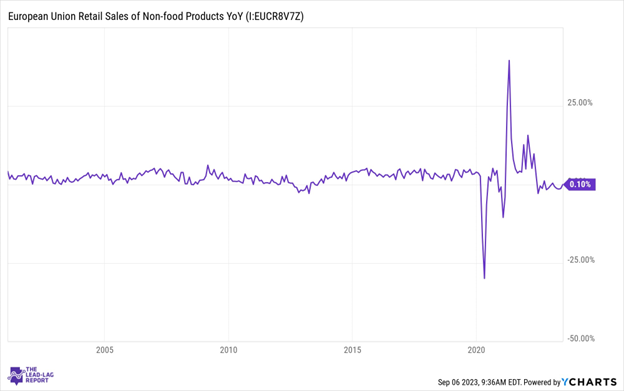Stock Market Crash Alert: Europe’s Economy Is in Severe Trouble
I’m not going to sugar coat this: Europe’s economy looks atrocious right now.
If you thought the Federal Reserve had a tough time dealing with inflation, you have no idea how difficult things are overseas. The European economy has been showing signs of slowing down for many months, fueled by a combination of factors such as high inflation, reduced consumer spending, and tightening of government budgets. Stagflation risk is very real here. If we look at the Vanguard FTSE European ETF (NYSEARCA:VGK), this is as far away from a “new bull market” as it gets.
If anything, it looks like equities internationally are about to roll over in a massive way.
InvestorPlace - Stock Market News, Stock Advice & Trading Tips

Source: Charts by TradingView
What’s going on here? Inflation in the eurozone has been stubbornly high, discouraging consumer spending and putting pressure on households. And while inflation has been falling, it’s still very elevated against highly indebted consumers.

Source: Chart courtesy of YCharts
This is a big deal. When we look at retail sales of non-food products year over year, we can see consumers have flatlined. There is just no demand to transact with high inflation, rising rates, and fragile governments. Plus, oil prices continue to surprise on the upside.

Source: Chart courtesy of YCharts
The European Central Bank plays a crucial role in managing the European economy. In the face of high inflation, the ECB is likely to continue raising interest rates. However, this could lead to further economic slowdown and exacerbate the current situation. It also risks a return of the 2011 eurozone crisis.
Raising interest rates can curb spending and ease demand-driven inflation. However, if the ECB continues to raise interest rates in an already-slowing economy, it could lead to a serious recession. The ECB needs to strike a delicate balance between maintaining price stability, its primary objective, and preventing a severe economic downturn. Good luck with that!
The Bottom Line
Why does this matter? Because just like emerging markets have gone nowhere for over a decade, Europe has faced the same problem and there appears to be no end in sight. The high inflation rate, coupled with declining consumer spending and government expenditure, could lead to a prolonged period of economic stagnation. This would reverberate to U.S. markets no matter how strong things appear domestically.
The ECB doesn’t have a dual mandate like the Fed. Its sole objective is to maintain price stability. If it follows the letter of the law on that, it might have a couple more rate hikes left in it before all is said and done. That, however, runs the risk of a further slowdown in an economy where a recession already appears imminent and the effects of much of the existing rate hike cycle have yet to show up.
This is an ugly situation that doesn’t look like it has a satisfying conclusion.
On the date of publication, Michael Gayed did not hold (either directly or indirectly) any positions in the securities mentioned in this article. The opinions expressed in this article are those of the writer, subject to the InvestorPlace.com Publishing Guidelines.
The Lead-Lag Report is provided by Lead-Lag Publishing, LLC. All opinions and views mentioned in this report constitute our judgments as of the date of writing and are subject to change at any time. Information within this material is not intended to be used as a primary basis for investment decisions and should also not be construed as advice meeting the particular investment needs of any individual investor. Trading signals produced by the Lead-Lag Report are independent of other services provided by Lead-Lag Publishing, LLC or its affiliates, and positioning of accounts under their management may differ. Please remember that investing involves risk, including loss of principal, and past performance may not be indicative of future results. Lead-Lag Publishing, LLC, its members, officers, directors and employees expressly disclaim all liability in respect to actions taken based on any or all of the information on this writing.
Michael A. Gayed is the Publisher of The Lead-Lag Report, and Portfolio Manager at Tidal Financial Group, an investment management company specializing in ETF-focused research, investment strategies and services designed for financial advisors, RIAs, family offices and investment managers.
InvestorPlace readers that are new subscribers to the The Lead-Lag Report can receive a 30% discount.
More From InvestorPlace
ChatGPT IPO Could Shock the World, Make This Move Before the Announcement
Musk’s “Project Omega” May Be Set to Mint New Millionaires. Here’s How to Get In.
The Rich Use This Income Secret (NOT Dividends) Far More Than Regular Investors
The post Stock Market Crash Alert: Europeâs Economy Is in Severe Trouble appeared first on InvestorPlace.
